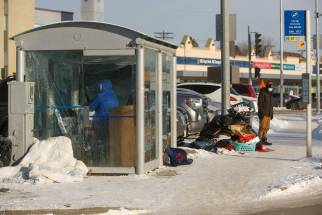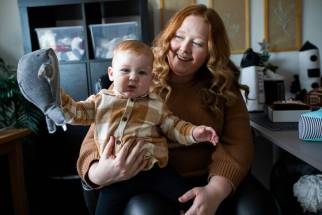Failure to consult compounds grief and pain
Read this article for free:
or
Already have an account? Log in here »
To continue reading, please subscribe:
Monthly Digital Subscription
$0 for the first 4 weeks*
- Enjoy unlimited reading on winnipegfreepress.com
- Read the E-Edition, our digital replica newspaper
- Access News Break, our award-winning app
- Play interactive puzzles
*No charge for 4 weeks then price increases to the regular rate of $19.00 plus GST every four weeks. Offer available to new and qualified returning subscribers only. Cancel any time.
Monthly Digital Subscription
$4.75/week*
- Enjoy unlimited reading on winnipegfreepress.com
- Read the E-Edition, our digital replica newspaper
- Access News Break, our award-winning app
- Play interactive puzzles
*Billed as $19 plus GST every four weeks. Cancel any time.
To continue reading, please subscribe:
Add Free Press access to your Brandon Sun subscription for only an additional
$1 for the first 4 weeks*
*Your next subscription payment will increase by $1.00 and you will be charged $16.99 plus GST for four weeks. After four weeks, your payment will increase to $23.99 plus GST every four weeks.
Read unlimited articles for free today:
or
Already have an account? Log in here »
Hey there, time traveller!
This article was published 09/12/2022 (1096 days ago), so information in it may no longer be current.
Marcedes Myran.
Morgan Harris.
Rebecca Contois.
Buffalo Woman.
Four women, all believed to be Indigenous, presumed to have been murdered in short order earlier this year by an alleged serial killer, their bodies likely dumped in a landfill.
The details of this horrific case have sent shockwaves through the country. The hastily delivered assertion from Winnipeg Police Service Chief Danny Smyth that there is “no hope” of finding their remains has turned that shock into outrage and calls for action.
“If you can’t find them, then why haven’t you asked for help?” Harris’s daughter Kera said during a news conference in Ottawa this week. “How can you even fathom the idea to leave them there?”
One week after police announced additional first-degree murder charges against the accused, Jeremy Skibicki — who had been arrested in May and charged with the death of Ms. Contois — operations at the Prairie Green Landfill were paused by local government leaders.
On Thursday, Premier Heather Stefanson and Winnipeg Mayor Scott Gillingham told media the facility north of Winnipeg will temporarily stop accepting material while officials determine how best to move forward.
That it took seven days to reach this decision is disconcerting. That it took bereaved children and loved ones begging for action to bring it about is inexcusable.
Family and friends of three murdered women gather at a vigil in Winnipeg. (John Woods / The Canadian Press)
Regardless of the logistical challenges of searching the landfill — Mr. Smyth has pointed to the sheer volume of material, including animal carcasses, that has accumulated at Prairie Green since the spring, and the danger posed to searchers by toxic substances such as asbestos buried there, as reasons an investigation wasn’t feasible — doing nothing is not a satisfactory response.
These victims were mothers, daughters, friends and sisters. Their lives had value and they were loved. And yet, in death, they were literally treated like garbage.
In this era of Truth and Reconciliation, when Indigenous women and girls continue to go missing and are being murdered at alarming rates in Canada, doing nothing in the name of feasibility is interpreted by many as a message that these victims are not worth the trouble. That Indigenous women and girls are disposable.
Operations at Prairie Green should have been paused as soon as revelations about these connected deaths came to light. Mr. Smyth should have consulted immediately with families and Indigenous leaders, as well as experts in hazardous “archeological” searches of this nature, regarding the dynamics and obstacles of the investigation, instead of unilaterally declaring, months later, at a media briefing that the retrieval of remains from Prairie Green is a hopeless pursuit. All possible avenues should have been explored in a transparent manner before the possibility of search was publicly abandoned.
The outcome may have been the same, but perhaps if loved ones had been made to feel part of the process and were given a full understanding of the challenges involved, they could have been saved from additional grief and suffering.
There still exists an opportunity to right some of those wrongs; to allow the community to grieve and to allow government officials to prove they are willing to devote time and resources to the victims in this appalling case. The joint appearance by Ms. Stefanson and Mr. Gillingham to announce the halt of the landfill’s operation was a step in that direction.
When Tina Fontaine was murdered in 2015, the inevitable and justified wave of outrage that followed led one publication to dub Winnipeg “Canada’s most racist city.” If this community ever hopes to shake free that unfortunate moniker, those in power need to rethink how its most vulnerable citizens are treated — in life, and in death.





















